A good keyboard can make or break your PC gaming setup. Upgrading yours is one of the easiest ways to improve your performance and make gaming more enjoyable overall.
A solid gaming keyboard doesn’t have to break the bank. There are plenty of great options that cost less than $100, with some available for less than $50. We tested out tons of budget-friendly keyboards to help you decide which one is going to give you the most bang for your buck.
Just like picking out a new gaming mouse, getting the right gaming keyboard has a lot to do with personal preference — from ergonomic design (hello, wrist rest) to whether you prefer RGB lighting, mechanical keys, tactile feedback, programmable keys, dedicated media keys or so many other features that we can’t even begin to list them. To help narrow your keyboard design preferences, check out GameSpot’s glossary of keyboard terms.
Read more: Best Gaming Mouse Under $50 for 2022
It’s worth noting that Aukey, which makes one of our top picks, was booted from Amazon last year because it was one of several vendors reported to have solicited positive user reviews for gift cards. But since our experience with the quality and value of Aukey accessories has been positive, we continue to recommend its hardware.
Josh Goldman/CNET
The $50 G14 is one of the most affordable mechanical gaming keyboards available and Aukey has stepped up its game with the build quality and software without increasing prices. This TKL keyboard is chunky but still saves desk space since it doesn’t have a number pad; check out Aukey’s G12 if you want that feature.
Although the case is all plastic, it has the heft of a metal frame. Combined with the nonslip pads on the bottom, this keyboard won’t slide around while you’re gaming. Plus, there are two sets of flip-out feet at the back giving you three typing angles to choose from — something you don’t always find on pricier keyboards. And while its USB cable is attached to the body, Aukey did add routing on the bottom so you can send the cable out to the left, right or center.
The company’s blue clicky switches are good for both typing and gaming with a tactile bump you can feel and hear. These switches have a loud click to them, something to keep in mind if you share a workspace). Also, there is no pinging from the switch springs, unlike the slimmer full-size G12 keyboard, so all you really hear is their click. There is some key wobble but it’s relatively minor and overall it’s a solid typing experience.
The keycap legends are difficult to read with the backlight off. However, with 18 preprogrammed lighting options to choose from and four brightness settings, there’s little reason to have the lights off entirely while you’re working. You can always replace the keycaps, too, and Aukey includes a puller. Software for the keyboard can be used to create your own per-key RGB lighting, set up key macros or change key assignments and save multiple profiles. The G14 is a great place to start if you’re just getting into mechanical keyboards for work or play.
Josh Goldman/CNET
If you’re most comfortable doing your office work on a membrane keyboard, the Cynosa might be the gaming keyboard for you. It’s a membrane keyboard, not mechanical, so the keys are quiet and definitely feel softer than the others here and some might find them mushy. Still, if you’re looking to use one keyboard for both work and play, this is a fine compromise for its $60 list price.
Many of the original Cynosa’s features carry over, including per-key RGB lighting — a rarity at this end of the market — and durable spill-resistant design. What’s new is a set of media keys added to the upper right corner. Razer also added cable routing under the keyboard so you can keep your desk a little tidier.
This is also one of the most programmable keyboards here. There are a lot of preset lighting effects to pick from and you can also create your own using the Synapse 3.0 software. There’s also Razer’s Hypershift feature that lets you set up a secondary set of functions for your keys that are accessed with a “shift” key you choose. You can also rebind keys and set macros with the software.
You’re receiving price alerts for Razer Cynosa V2 Gaming Keyboard
Josh Goldman/CNET
Whirlwind FX’s Atom 60% mechanical gaming keyboard isn’t too different from other similarly sized options. The compact build is a space saver, great if you need extra mousing room while you game. It’ll also slide easily into a backpack for travel. (It also has a removable braided USB-C cable to help with that.) The company offers a choice of three mechanical switches, and they’re all brilliantly lit with RGB LEDs.
The Atom’s backlighting, or more specifically the software that controls them, is where this little keyboard stands out. The thing is, you don’t even need the keyboard to use the software.
The SignalRGB app lets you set the keyboard’s lighting to have different effects during regular use and when media is playing including various games. The app has a library of game integrations to choose from. I tested the Battlefield V integration, for example, and it does things like turn the keyboard lights red when HP is low or green when you’re healed. The Fortnite integration will change the keyboard to pink and red when you take damage or purple when you add experience. There are a lot of games available and, if you really like to tinker, you can create your own integrations using the company’s open-platform lighting software.
However, the SignalRGB software lets you take things a step further by expanding the effects to your other RGB gaming peripherals. It supports more than 150 devices from Razer, Corsair, HyperX, Logitech, SteelSeries and others. You can also request others that aren’t supported yet.
Also, if you prefer a full-size keyboard, check out the company’s second-gen Element keyboard that has the same switch options but it has directional keys and a number pad.
You’re receiving price alerts for WhirlwindFX Atom 60% Gaming Keyboard: Interactive and Customizable Lighting – Immersive, Reactive RGB Experience (Blue Clicky)
Sarah Tew/CNET
Even on Logitech’s lower-end models such as the G413 backlit gaming keyboard, the company doesn’t cheap out on build quality and components. It uses the same Romer-G Tactile switches found on its more feature-filled models and has the same slim, simple and durable keyboard design with brushed aluminum-magnesium alloy top case. It has a braided USB cable with a USB passthrough port on the back right and channels underneath for mouse and headset cable management.
The tactile key switch is relatively quiet with no click when actuated, just a subtle bump and a short actuation. If you love to hear and feel your keypresses, this probably isn’t the best switch for you. There’s just one color for the backlight — red — but the backlighting is bright and the key font on this full-size keyboard is easy to read. Logitech includes 12 faceted keycaps, which is nice but we didn’t feel much difference.
The G413 is programmable with Logitech’s G Hub software, letting you set up macros and custom functions on the F1-F12 buttons and there’s a game mode that shuts off the Windows key. Overall it’s a more polished mechanical gaming keyboard than the others here, but it’s also pricier.
You’re receiving price alerts for Logitech G413 Backlit Mechanical Gaming Keyboard (Carbon)
Sarah Tew/CNET
If you want a wireless gaming keyboard and lights, consider the K57. This budget wireless keyboard uses rubber-dome switches with a pronounced actuation point, which gives it more of an office-keyboard feel like the Razer Cynosa. Gaming on it requires a touch more force than the mechanical keyboards here and rollover is limited to eight keys. Aside from those, the experience is just fine.
The K57 wirelessly connects to your PC via low-latency Bluetooth or Corsair’s 2.4GHz Slipstream technology that uses a tiny USB-A adapter for lag-free gaming. It can also be used wired with the included Micro-USB cable, which charges up the keyboard, too. While it doesn’t have the longevity of the Logitech when you’re using the per-key RGB lighting, you can get through several days of gaming without needing to charge it up.
A row of dedicated macro keys on the left and discrete media controls on the right round out the features. Plus, Corsair’s software is straightforward to use, which makes creating custom keyboard lighting and setting up those macro keys pretty painless. At $80, however, you’re definitely paying more for those features.
You’re receiving price alerts for Corsair K57 RGB Wireless Gaming Keyboard
Sarah Tew/CNET
Finding a good wireless gaming keyboard can be difficult. These babies are a rarity because the last thing you want to do is potentially introduce lag into your performance. The G613’s Lightspeed wireless performs as well as wired and its battery life is stellar at up to 18 months on two AA-size batteries. That said, the keyboard has no backlight whatsoever, which while understandable for the power savings, no keyboard backlighting really kills the gaming experience in the dark. You do get six programmable buttons down the left side, so that’s something.
The G613 uses the same Romer-G Tactile mechanical switches as the G413, so everything I said about that one applies here. I happen to like the feel of this switch for gaming and typing, though I was in the minority for our testing. This wireless keyboard is definitely one you should try before you buy if you can.
You’re receiving price alerts for Logitech G613 Wireless Gaming Keyboard
More gaming and WFH essentials
Best Gaming Keyboard Under $100 for 2022 – CNET
Source: Media Star Philippines


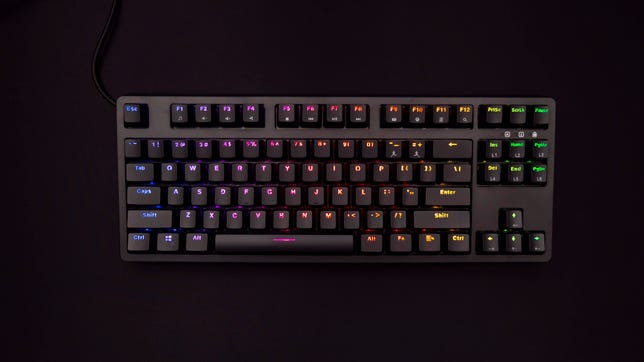
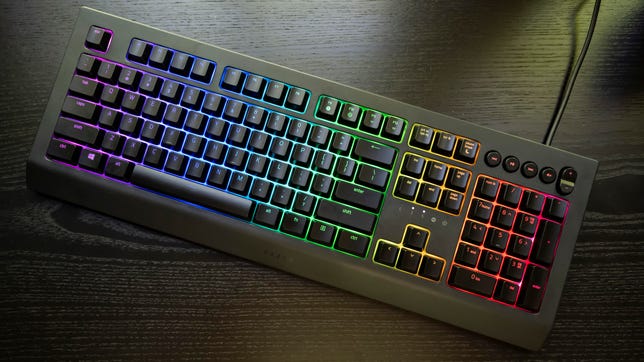
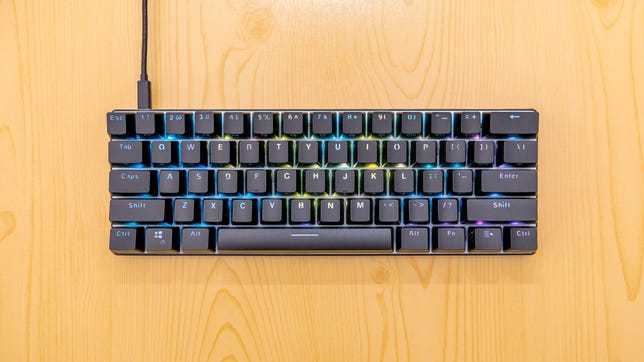
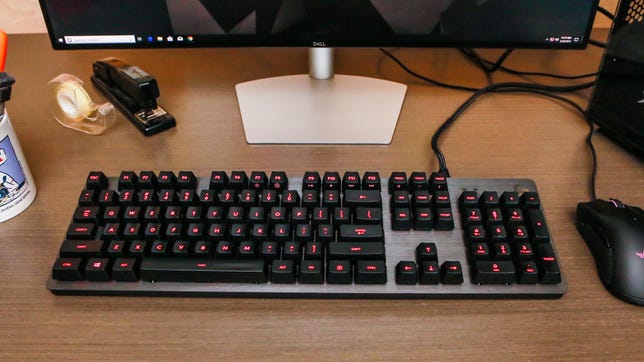
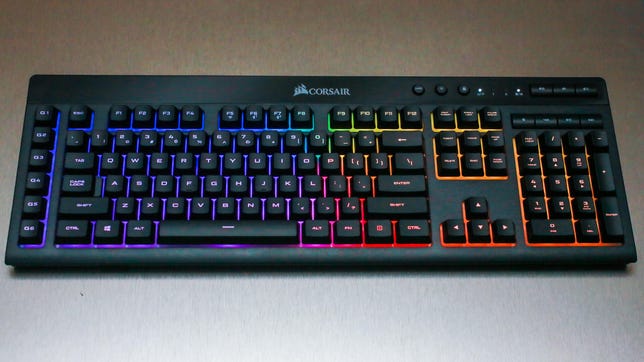
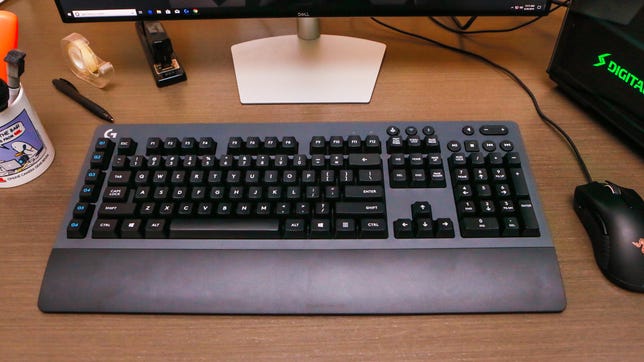
0 Comments